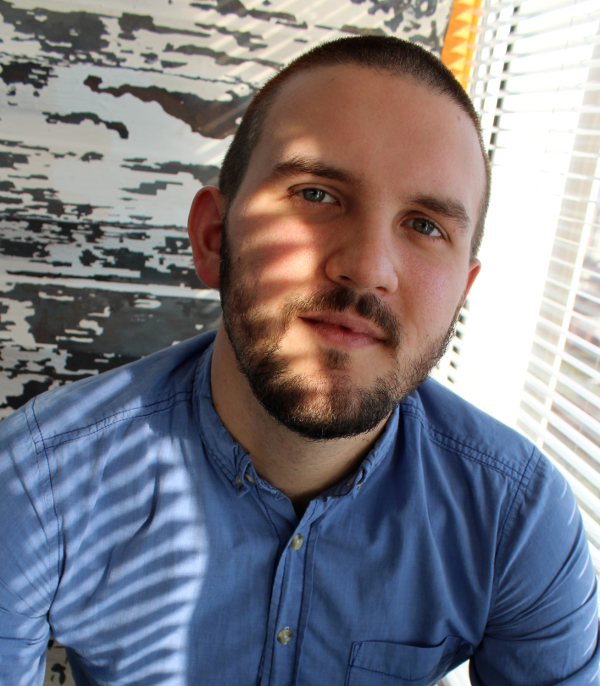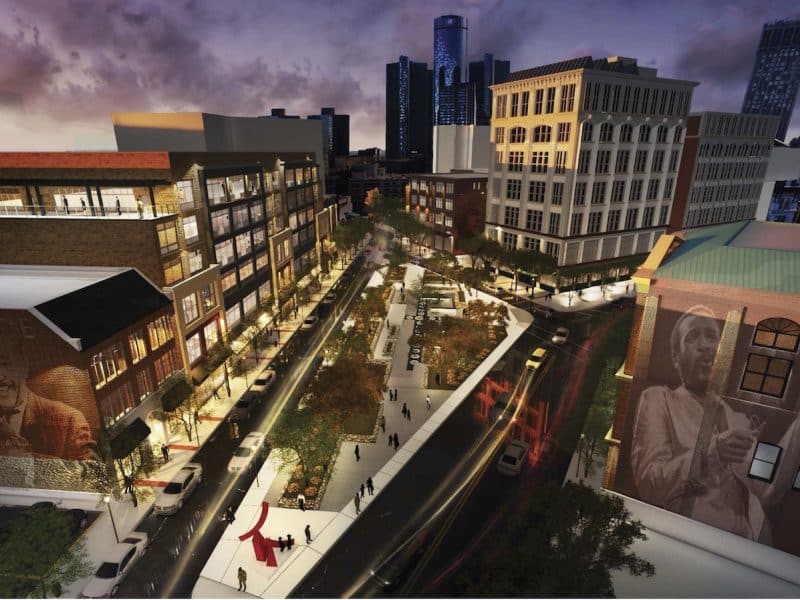10 Years of Change: A writer’s reflection
Regular Model D contributor Matthew Piper reflects on the joys and challenges of writing in and about Detroit over the last decade.

Seems like everybody in Detroit has a side hustle these days. You’ve got the main gig that (hopefully) pays (most of) the bills, and when you’re done with that for the day, you work on the other thing. If you’re lucky, this is more than an obligation. Maybe it’s even a passion – the small business you’re growing, the old house you’re resurrecting, the art project that just keeps evolving.
I consider myself fortunate, these last years, to have worked a couple full-time professional jobs that I’ve actually loved, first at a forward-thinking suburban public library and then, for the last several years, at the one-of-a-kind Green Garage in Midtown. But I’ve been hustling on the side, too, spending evening and weekend hours doing that thing I’ve been doing for as long as I can remember, that thing I evidently can’t not do, the very thing that brings us together right now, dear reader: writing.
It can be a terrible thing, writing. It’s lonely, painstaking, and for most writers, not exactly lucrative. And writing in the age of digital publishing can be singularly stressful if, like me, you happen to have both readers and neuroses. (“Did I miss the mark? Is that sentence too wordy? Am I connecting with anybody? Am I really contributing to the conversation or am I just pumping out more fodder for the social media machine? And damn it, why hasn’t anybody liked this yet?!”) I like to think of this as my regularly scheduled, post-publication mad scene, played for an audience of one — two when you count my dear, patient husband.
Beyond that, I tend to write nonfiction about Detroit today, which I think we can all agree is one of the most fraught and complicated places to go on the record about, ever. (It’s as Timothy van Laar put it in last November’s issue of Infinite Mile: “Everything is used ideologically in Detroit, and everything, therefore, is potentially contentious.”) So there’s this whole other layer of anxiety (necessary, productive, search-your-soul-and-find-your-place-in-this-place anxiety, but anxiety nonetheless): Who am I writing for? Who am I unintentionally omitting from my narrative? Am I passing off the privileged for the universal or telling a truly inclusive story?
But for all that, I press on, regularly writing about the local people, places, and things I’m interested in for a handful of publications whose editors put up with me. And I keep going, I think, not just because I’m compelled to out of some innate, writerly disposition (though surely that’s part of it), but also because there’s nothing quite so enriching. Because behind every article, essay, and interview is a conversation with at least one vivid, fascinating Detroiter, and because each represents an opportunity to learn as well an opportunity to inform, to consider with ever more nuance our great and troubled city. Writing about a place is a special way of inhabiting a place, and it affords its own privileges: the privilege to tell the story, of course, to help shape the narrative, but also to go, physically and mentally, where you wouldn’t otherwise; to check the small talk and dive right into deep discourse with people who are, most of the time, perfect strangers.
While I’ve lived in Detroit for eight years, and had opportunities to write about it professionally for five, I’ve been recording my thoughts about the city for more than a decade, since I was a clueless but curious suburban kid commuting to Wayne State and tentatively exploring the vast, ancient newness I was surprised to find all around me. Those early impressions, recorded in journal entries circa 2002-2006, are full of aspirational suburban malaise (“Will I ever actually get to live in the city?”), predictably romantic English major preoccupations (“The ruined beauty!”), and wide-eyed, newbie revelations (“Last night I went to this amazing party where everybody was making out and dancing to the Talking Heads!”), but hey, you’ve gotta start somewhere.
Eventually, I found opportunities to step outside myself in my writing, to dig deeper into the fertile ground all around me — and to get paid for it! And what a time to have done so. My work covering the local culture beat during this remarkable period of urban flux has taken me clear across the city, to places I’d never have visited on my own, from a slick, sky-high boardroom to a mountainous pile of compost; from a sprawling, fine-tuned factory to the cozy living room of a legendary neighborhood matriarch. It’s introduced me to farmers, scientists, activists, architects, developers, entrepreneurs, educators, organizers, business and nonprofit leaders, and more artists and artisans than you could shake a piece of reclaimed wood at. (I know I’m not supposed to have favorites, but can I confess that I do? Just between you and me, it’s the artists; they’re so friendly and free.)
I like to think that my conversations with all these people, as well as the relationships I’ve formed with a handful of them, have helped me learn an important lesson about writing about Detroit — about writing in general. You can’t do the topic justice at the macro level. You can’t ever wrap this place up in a narrative and slap a bow on it. You can’t say “Detroit is this” or “Detroit is that,” especially in short form writing, because the minute you do, you realize how easy it would be to contradict yourself (“Except, of course, that Detroit isn’t this at all, because just a mile or a mind away, it’s really more that….”). You can only start from the specific and then maybe, over time, a picture starts to emerge, but it’s never a picture you can see whole, never something that isn’t in process, changing, growing more complex and unfamiliar while you watch.
So as Model D’s 10th year comes to a close and I take a moment to reflect on my own first decade of writing about Detroit, the place I call home, the place my grandparents once called home before they beat it for the ‘burbs, I’m not really interested in saying, “Here’s what I know about Detroit now,” as tempting as that is. Instead, I want to say: man, what a town. I want to say: thanks for reading. Here’s to 10 more years! I want to say: writing about Detroit is a gift that has made me a better critical thinker, a more engaged citizen, and a more humane human being. Not bad for a side hustle.
Matthew Piper writes about art, culture, and sustainability in Detroit. Find him on Twitter at @matthesaurus and Instagram at @matthewjpiper.
Photo by Michel Francois Soucisse.
This story is a part of “10 Years of Change,” a year-long series celebrating Model D’s decade of publishing in Detroit. Read other stories in the series here. Support for “10 Years of Change” is provided by the Hudson Webber Foundation.





